Fitzwilliam College Online Winter School Programme
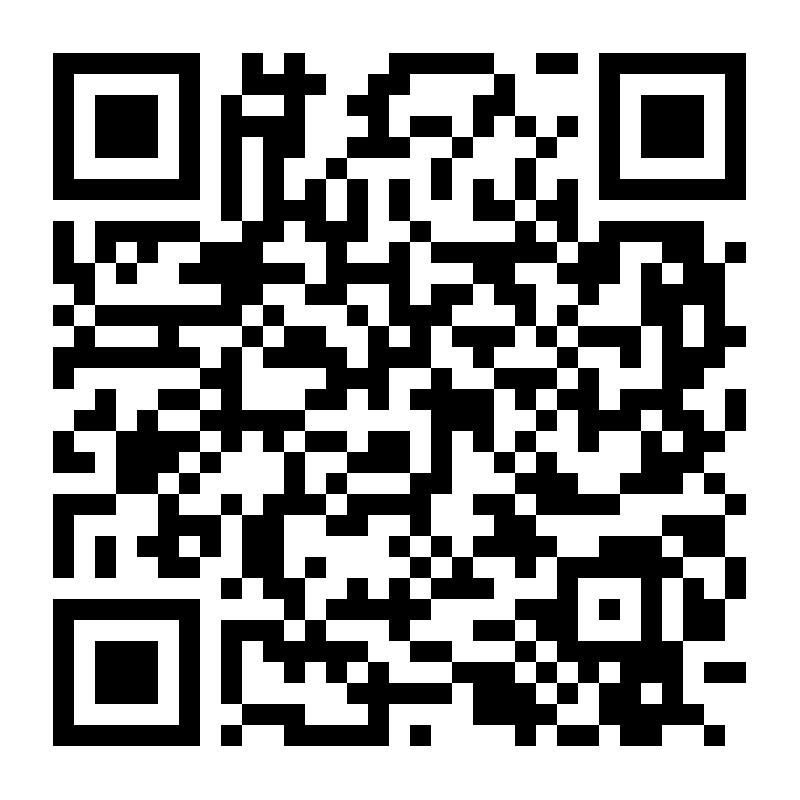
Optional Subjects
Mechanical and Electrical Engineering
Special Relativity and Quantum Mechanics
Computer Science:Computer Science: Artificial Intelligence and Machine Learning
— Invitation letter —
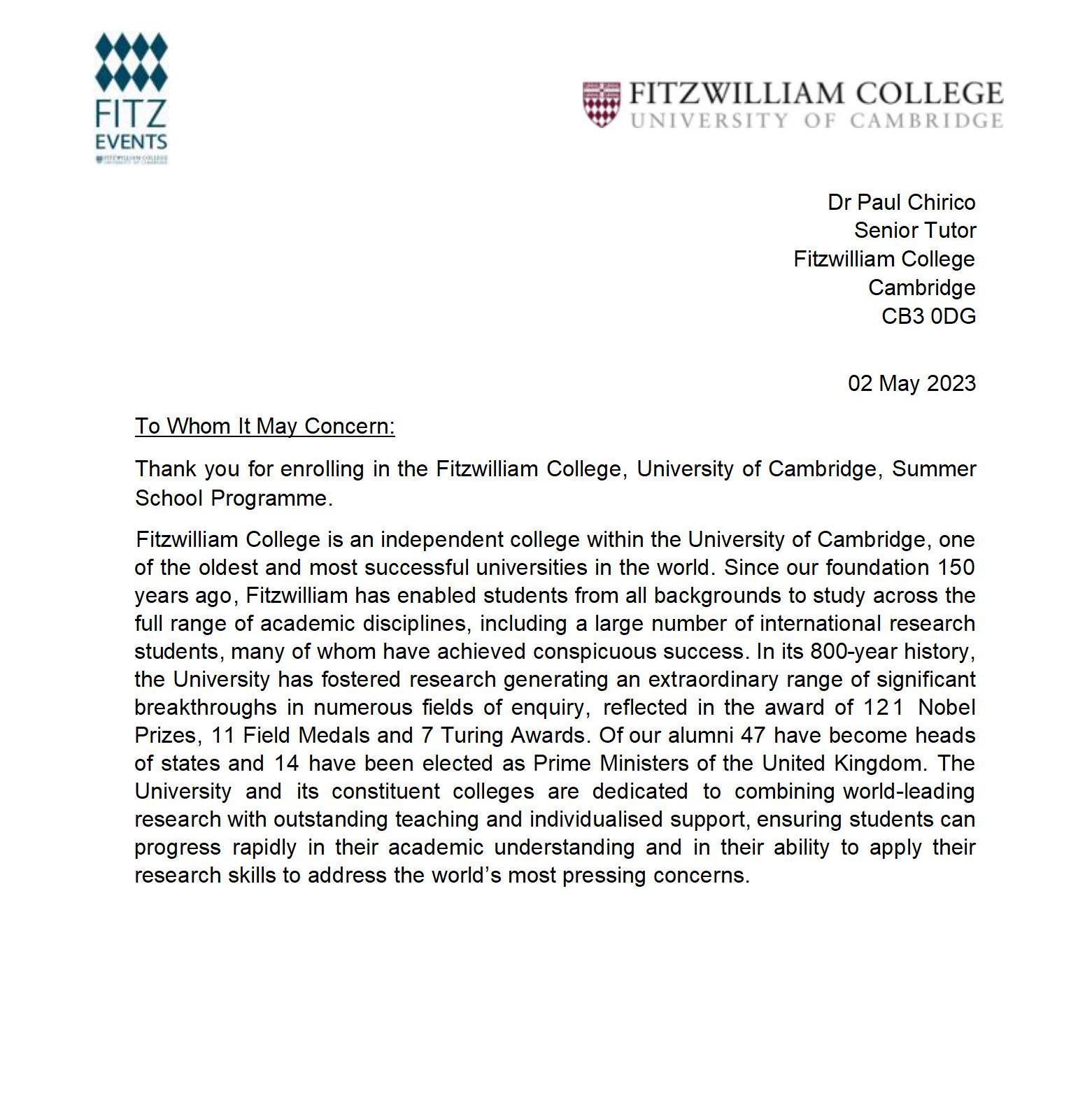
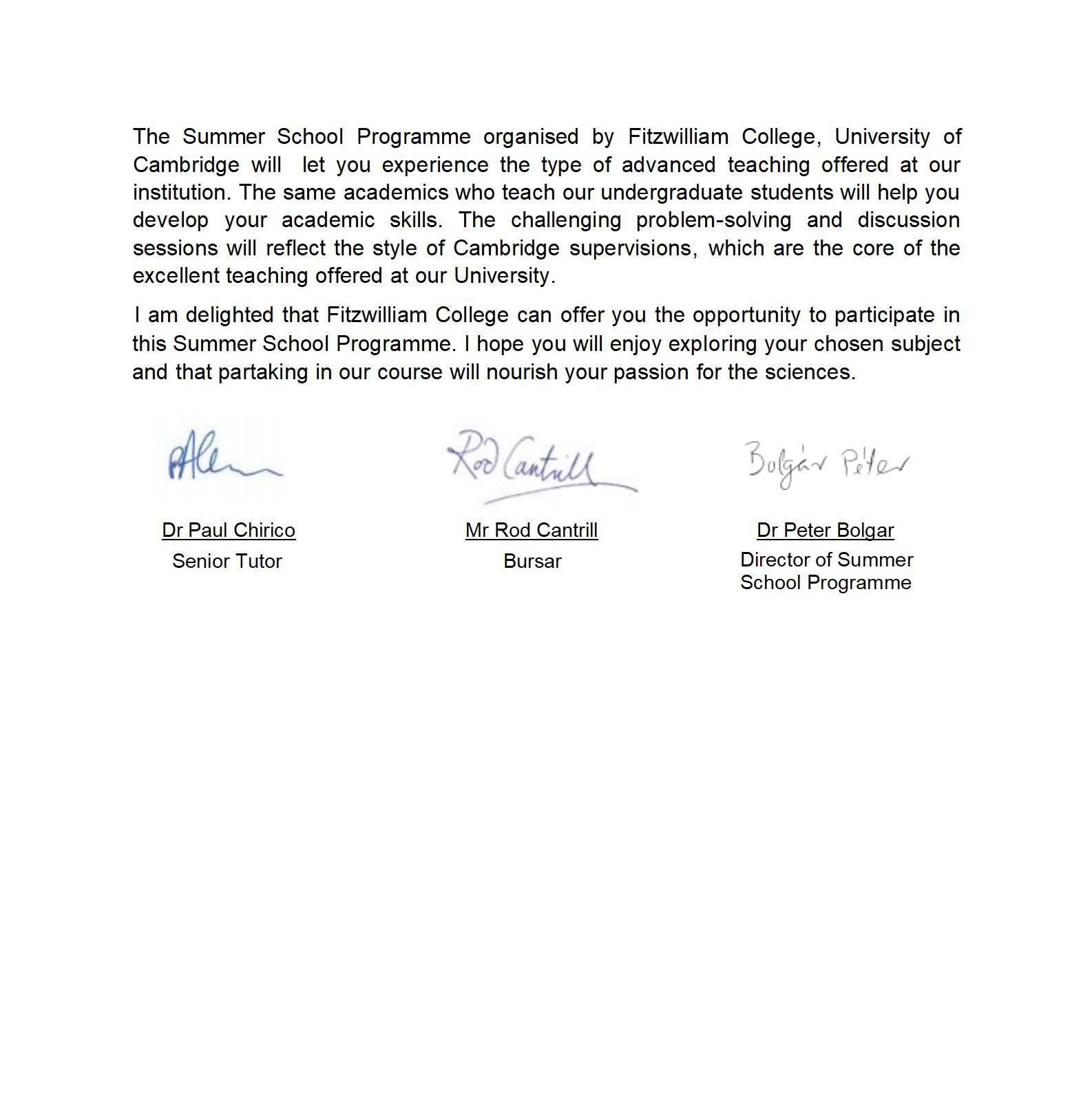
— About University of Cambridge —
Founded in 1209, the University of Cambridge is the fourth-oldest university in the world. Fitzwilliam College is one of the 31 constituent colleges of the University of Cambridge, with a rich history of inclusive education. Research and education across the 150 faculties and departments of the university cover a vast array of fields. Many of the subjects taught at Cambridge are ranked in the top 5 worldwide by the QS world university rankings by subject.
— Introduction —
The FitzEd Online Winter School is the official winter school of Fitzwilliam College, one of the constituent colleges of the University of Cambridge. The programme will let you experience the type of advanced teaching offered at our institution. The same academics who teach our undergraduate students will help you develop your academic skills. The challenging problem-solving and discussion sessions will reflect the style of Cambridge supervisions, which are the core of the excellent teaching offered at the University.
No more than 15 participants will be enrolled in each course to ensure that you make the most out of your time with us. You will be offered a minimum of 30h of tuition across the 2-week programme. You will also need to work a minimum of 8h on your research project.
In 2023, Fitzwilliam College and ASEEDER have entered a strategic partnership to open the Fitzwilliam College Summer and Winter School Programmes to outstanding high school students in China. Since 2023, more than 500 students from across the country participated in these programmes. In the winter of 2026, we will offer 2-week long online programme in Mechanical and Electrical Engineering, Special Relativity and Quantum Mechanics, Computer Science: Artificial Intelligence and Machine Learning.
You can also visit the website of Fitzwilliam College at https://www.fitz.cam.ac.uk/fitzed to view more information.
可选课程
数学
计算机科学
化学
物理
生物
医学
行为心理学
工程
— Why us? —
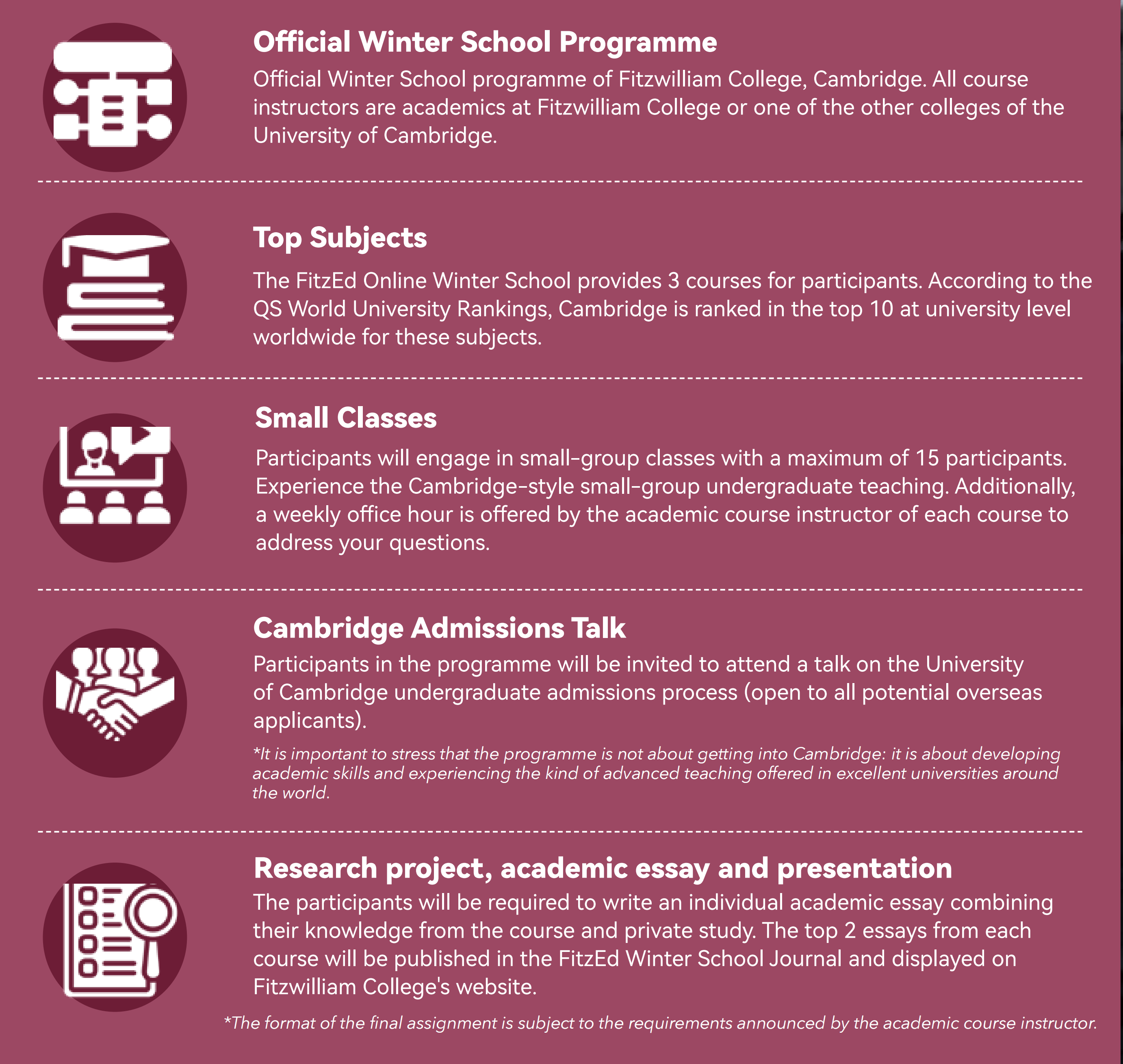
— Outcomes —
● Students who attend at least 90% of the classes, write their essay and give their presentation will receive a certificate of completion by Fitzwilliam College.
● Each student will write an academic research essay and presentation and receive detailed individual feedback from the academic course instructor.
● Top 2 best performing students will receive an award certificate.
● The authors of the best 2 essays will receive a top essay certificate.
● The top 2 essays from each course will be published in the FitzEd Summer School Journal and displayed on Fitzwilliam College's website.
Detail>>
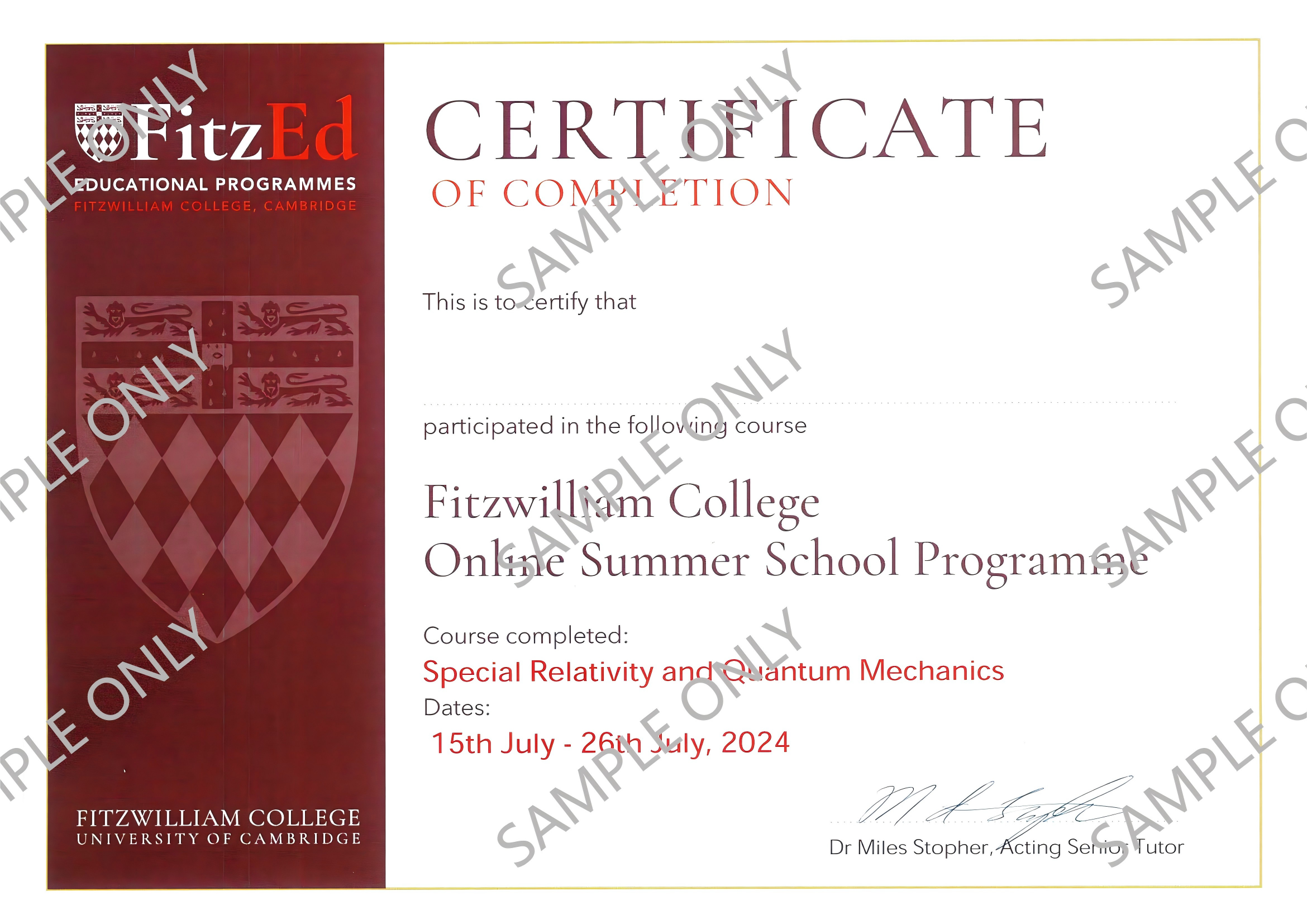
Certificate of Completion
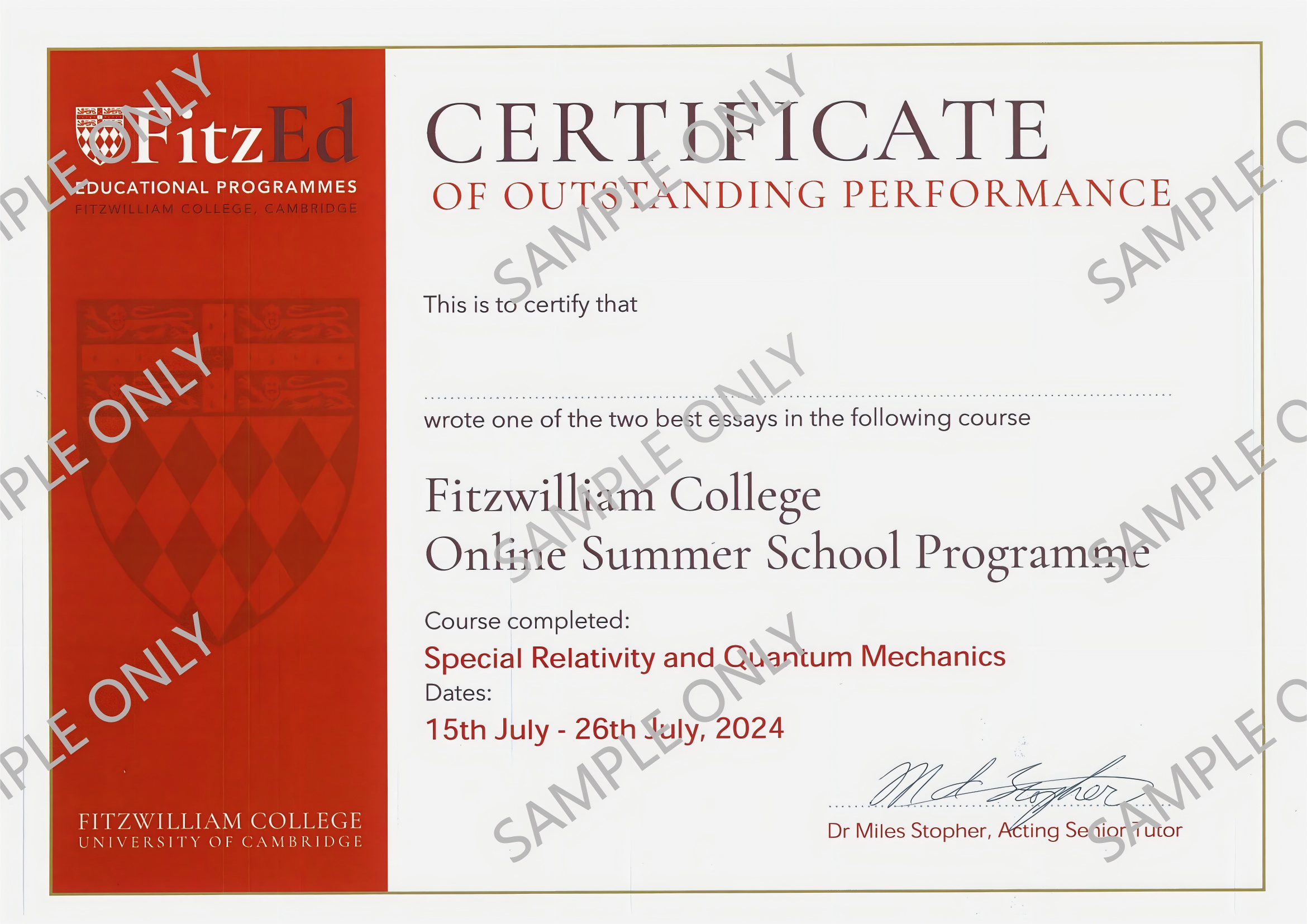
Award Certificate
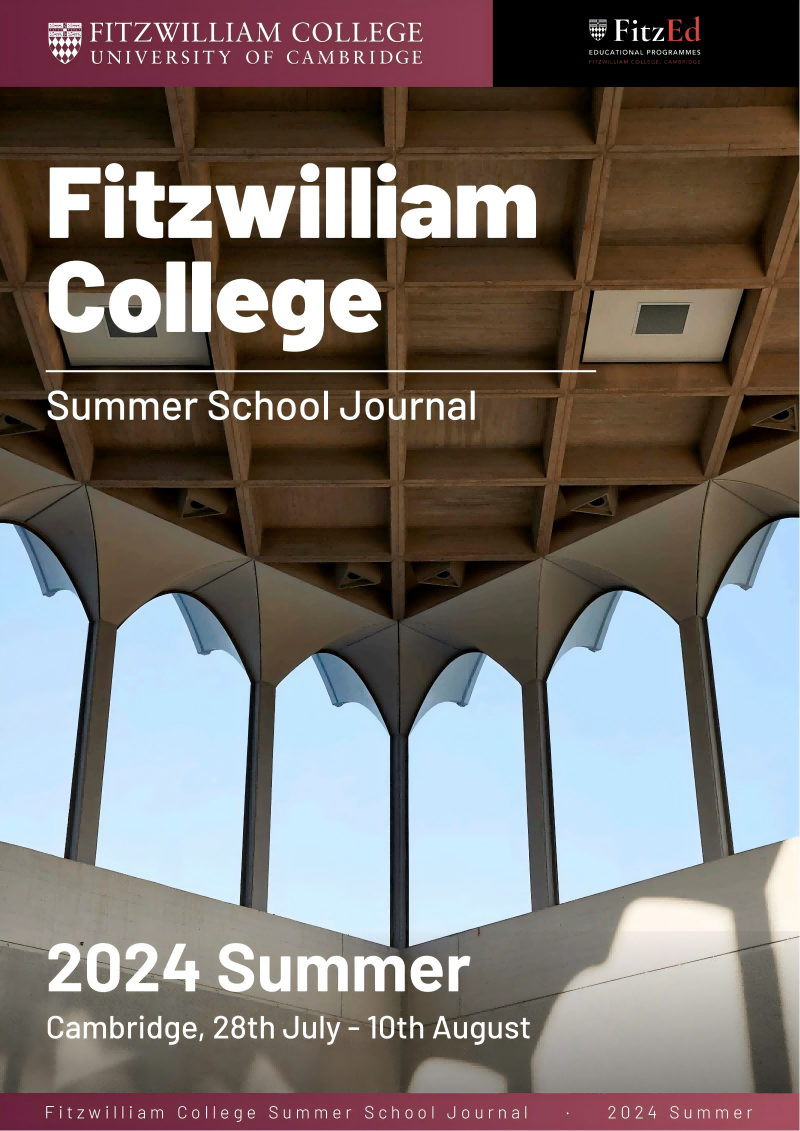
2024 FITZWILLIAM SUMMER SCHOOL JOURNAL
This is an annual journal publishing the best essays written by the top-perorming students of the FitzEd Summer School which is the official summer programme of Fitzwilliam College in the University of Cambridge.
The journal covers eleven fields: Mathematics, Physics, Computer Science, Microbiology, Elements of Mathematical Economics, Engineering, Chemistry, Medicine, Palaeobiology, Philosophy, and Nuclear Engineering.
— Instructor and Syllabus —
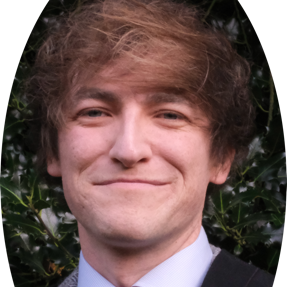
Dr Miles Stopher
Director of Admissions and Affiliated Lecturer, Department of Engineering, Cambridge Senior Lecturer, Fellow and Director of Studies in Engineering, Homerton College Bye-Fellow in Engineering at Fitzwilliam College
Dr Miles Stopher is a Senior Lecturer in Engineering at Homerton College and the Director of Admissions and an Affiliated Lecturer in the Department of Engineering. He is a Bye-Fellow of Fitzwilliam College, having previously been Acting Senior Tutor. He has supervised and directed studies in Engineering for 10 years, across a number of colleges at the University, including his alma mater, Jesus College. He lectures Nuclear Materials for Part III materials scientists at Cambridge, An Introduction to Materials Science for Engineers, and Nuclear Materialsfor Engineers on the MPhil in Nuclear Energy. He has also lectured on nuclear safety. Miles supervises Part IA and Part IB Mechanics, Materials and Structures to engineering undergraduates at Cambridge. Prior to his arrival at Cambridge, he worked on the design of the Royal Navy’s Dreadnought-class nuclear-powered ballistic missile submarines.
■ Course Content
Engineering has many branches, but the oldest and broadest is mechanical engineering. Mechanical engineers look at the design, analysis, and manufacturing of mechanical systems and machines that keep our world moving forward. Electrical engineering was born in the 18th century, known then as "the youngest of the sciences". Electrical engineers study electricity, electronics and electromagnetism, and their application in the design, development, and testing of systems. This intensive course offers a valuable insight into what it is like to study mechanical or electrical engineering at university, covering the most prominent specialisms within the fields. The course covers a broad range of topics carefully selected to build from one another. Students will follow the historical development of the respective technologies, learn and apply their shared principles, and gain an insight into future developments within these fields. As such, students should graduate from the course with a good understanding of the foundational concepts on which the respective specialisms are built and apply them to real-world problems, acquiring the skills and knowledge necessary to gain a head start in studying engineering at university.
| Date | 8th February Sunday
5 pm - 8 pm |
9th February Monday
5 pm - 8 pm |
10th February Tuesday
5 pm - 8 pm |
12th February Thursday
5 pm - 8 pm |
13th February Friday
5 pm - 8 pm |
| Mechanical Engineering: Aerospace - Aircraft Design & Aerodynamics | Mechanical Engineering: Aerospace -Aircraft Propulsion & Airframes | Mechanical Engineering: Engines –Steam | Mechanical Engineering: Engines –Internal Combustion | Mech/Elec Engineering: Power Plants – Nuclear | |
| Date | 14th February Saturday
5 pm - 8 pm |
18th February Wednesday
5 pm - 8 pm |
19th February Thursday
5 pm - 8 pm |
20th February Friday
5 pm - 8 pm |
21st February Saturday
5 pm - 8 pm |
| Mech/Elec Engineering: Power Plants – Renewables | Electrical Engineering:
Electronics -DC Circuits |
Electrical
Engineering: Electronics -AC Circuits |
Electrical Engineering: Electronics - Integrated Digital | Final Presentations |
*List of prerequisite knowledge:
The emphasis during the course will be on the physical understanding of the principles involved. Only elementary mathematical methods will be used. The key is the engineering and not the mathematics behind it. As such, I expect students to have a basic awareness of circuits and their components, alongside a basic understanding of mechanics (see below).
*Test your knowledge of the prerequisites! Can you answer the questions below?
1.Name the components (A, B, C, D and E) in the circuit:
2.A train travels from town A to town B ,as shown in the scale diagram.
a)The distance the train travels between A and B is not the same as the displacement of the train. What is the difference between distance and displacement?
b) Use the figure below to determine the displacement of the train in travelling from A to B.
c)There are places on the journey where the train accelerates without changing speed. Explain how this can happen.
d)The Figure below shows how the velocity of the train changes with time as the train travels along a straight section of the journey. Estimate the distance travelled by the train along the section of the journey shown.
*Office hours: to be determined closer to the time.
*Fitzwilliam College reserves the right to changes to the course content or the course instructor.
*For more course details, please click to view the handbook.
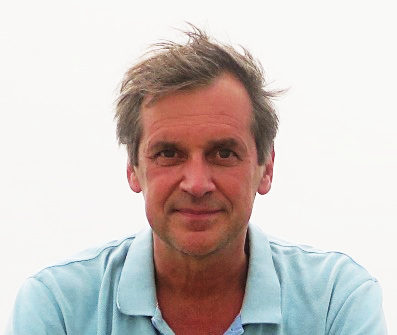
Dr. Joao Rodrigues
Bye-Fellow of St Catharine’s College, University of Cambridge
After many years working in Quantum Field Theory and Particle Physics, specifically in the parton structure of the nucleons, I changed my field of research to the climate of the polar regions. In the Polar Oceans Physics Group in Cambridge, I studied how the Arctic sea ice cover has changed in recent decades as a consequence of global warming. I examined sea ice thickness data collected by submarines and satellites and attempted to quantify the dramatic thinning of the Arctic Sea ice. At present, I teach several Physics and Mathematics courses for first-, second- and third-year students in the Natural Sciences and the Mathematical Tripos of the University of Cambridge.
■ Course Content
The motion of particles at speeds close to the speed of light is described by equations that are very different from those that we apply to study the motion of the objects in our daily life, such as the planets around the Sun. Special Relativity provides the theoretical framework to study those fast moving particles. We shall study phenomena such as the time dilation, length contraction and the famous twin paradox, which have no counterpart in the classical theory.
And let us explore the Quantum World. The atomic and subatomic particles behave in a way that for us, used to the certainties of Classical Dynamics and Electromagnetism, is unambiguously strange. Quantum Mechanics suggests there is an essential randomness in quantum phenomena and the best theory we have, based on the wave function and Schrodinger equation, can only predict the probabilities of events to occur. Such peculiarities of the theory were not appealing to everyone. We shall look at how Einstein objected to the standard formulation of Quantum Mechanics and how his ideas led to new developments.
| Date | 9th February Monday
5 pm - 8 pm |
10th February Tuesday
5 pm - 8 pm |
11th February Wednesday
5 pm - 8 pm |
12th February Thursday
5 pm - 8 pm |
13th February Friday
5 pm - 8 pm |
| The Lorentz
Transformation |
Relativistic
Kinematics |
Relativistic
Dynamics |
Relativistic Optics | Appearance of
rapidly moving objects |
|
| Date | 14th February Saturday
5 pm - 8 pm |
18th February Wednesday
5 pm - 8 pm |
19th February Thursday
5 pm - 8 pm |
20th February Friday
5 pm - 8 pm |
21st February Saturday
5 pm - 8 pm |
| The historical
development of QM |
The postulates
of QM and simple applications |
Heisenberg’s
Uncertainty relations |
The EPR paradox and
Bell’s inequality |
Final
Presentations |
Newtonian dynamics: Newton’s Laws, Notions of force, mass, momentum, energy and work
Optics: The laws of reflection and refraction, Notion of frequency, period, wavelength
Mathematics: Elementary techniques of differentiation and integration, Techniques for solving simple first and second order differential equations (desired but not strictly necessary)
*Test your knowledge of the prerequisites! Can you answer the questions below?
1. Igor is a cosmonaut in the International Space Station, orbiting the Earth at an altitude of 408 km at speed of 28000 km/h. What is his acceleration and what gravitational force does the Earth exert on him.
2. You apply a 4.9 N force to the free end of a spring, stretching it from its relaxed state by 12 mm. What is the spring constant? What force does the spring exert on you if you stretch it by 17 mm? How much work does the spring force do on your hand?
3. The wavelength of x rays produced in the Stanford Linear Accelerator is 0.067 fm; what is the frequency of these x rays?
*Recommended reading list (optional):
Halliday and Resnick, Fundamentals of Physics (Relativity and Quantum Mechanics chapters only);
A Einstein, The Principle of Relativity;
R Feynman, The Feynman Lectures on Physics, Quantum Mechanics (Chapter 1 only);
*Office hours: to be determined closer to the time.
*Fitzwilliam College reserves the right to changes to the course content or the course instructor.
*For more course details, please click to view the handbook.
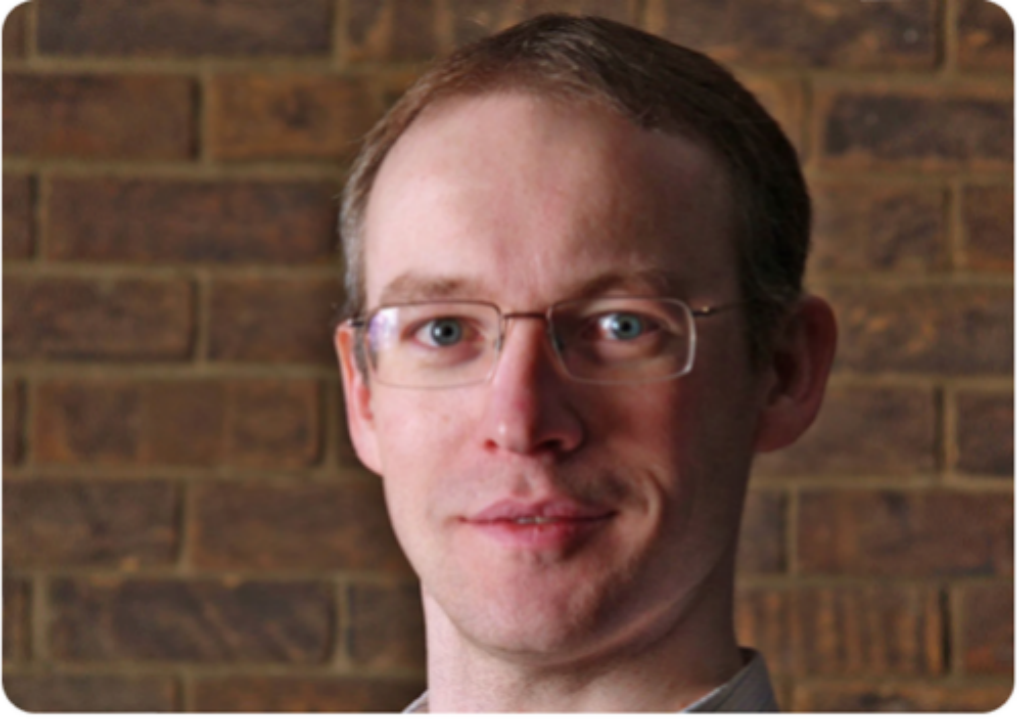
Dr John Fawcett
Fellow, Tutor, Praelector and Director of Studies in Computer Science at Churchill College Bye-Fellow in Computer Science at Homerton College, Lucy Cavendish College, Hughes Hall, and St Catharine’s College, University of Cambridge
Since completing his PhD, John Fawcett has been working in industry alongside lecturing, tutoring, supervising and directing studies in Computer Science at Cambridge. Over more than 15 years, John has seen around 500 students through to graduation. John has delivered courses in summer schools for over 10 years and is active in undergraduate admissions, including as Subject Convenor for the Computer Science undergraduate course. John served as University Senior Proctor in the 2021/22 academical year after being Praelector for 6 years at Churchill.
■ Course Content
Artificial intelligence (AI) and machine learning (ML) have featured in the news regularly in recent years as technology continues to transform our social and work lives. This course explores the problems that we can solve with AI and ML and takes a deep dive into how we create them, including the key maths and algorithms. It moves from narrow-focused classical AI systems to solving open-ended problems that humans cannot necessary solve. Looking beyond today's AI and ML systems, the course looks at the challenges that the technology has still to overcome, posturing you to understand the next wave of developments.
| Date | 8th February Sunday
2 pm - 5 pm |
9th February Monday
2 pm - 5 pm |
10th February Tuesday
2 pm - 5 pm |
11th Feb Wednesday
2 pm - 5 pm |
12th Feb Thursday
2 pm - 5 pm |
| Programming
with Prolog |
Planning
problems |
Interactive
decision making |
Understanding
Knowledge |
Theorem Provers | |
| Date | 13th Feb Friday
2 pm - 5 pm |
14th Feb Saturday
2 pm - 5 pm |
18th Feb Wednesday
2 pm - 5 pm |
19th Feb Thursday
2 pm - 5 pm |
20th Feb Friday
2 pm - 5 pm |
| Simultaneous
requirements |
Scaling to real-
world problems |
Training a Neural
Network |
Limits of machine
learning |
Final
Presentations |
*List of prerequisite knowledge:
No computer science knowledge is assumed but programming experience is always useful
*Test your knowledge of the prerequisites! Can you answer the questions below?
Suppose you have a function that can tell you which of two items, A and B, should come first in a sorted list.
1. What is the difference between a tree and a graph data structure?
2. Why might breadth first search not perform well on a graph?
3. Why might depth first search not perform well on a graph?
*Office hours:
5.30 pm – 6.30 pm Thursday 12th February
5.30 pm – 6.30 pm Thursday 19th February
*Fitzwilliam College reserves the right to changes to the course content or the course instructor.
*For more course details, please click to view the handbook.
Sample Schedule
Sample Agenda
| Beijing Time | Activities | |
| 10:00 - 11:30 | Online Extracurricular activities lead by bilingual TA (2 times in total) | |
| 11:30 - 14:00 | Individual study and assignment | |
| Please check the syllabus | Live Course by Cambridge academics | |
| Office Hour (Twice during the programme) | ||
*Please check the syllabus. The teaching times may change at the discretion of Fitzwilliam College, Cambridge.
— Programme Information —
Application
- Date: 8th February – 21st February, 2026 (30-hour live course, 2 Office Hours)
- Grade:10 - 12
- Subject: Mechanical and Electrical Engineering Special Relativity and Quantum Mechanics Computer Science: Artificial Intelligence and Machine Learning
Requirements
-
• Students who achieved A or above in ASDAN EPQ can be admitted directly
• Individual applicants need to submit English language performance (IELTS level 6.5 or TOEFL 90) and A or above in relevant subject
• If you do not meet the above criteria, you will be required to do a telephone or an online interview in English with an ASEEDER teacher


